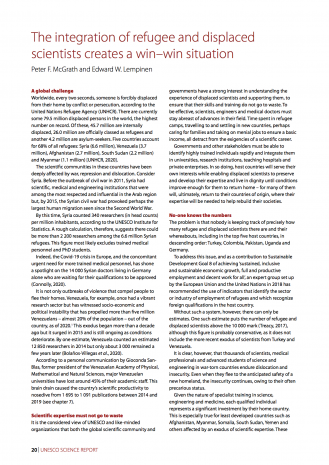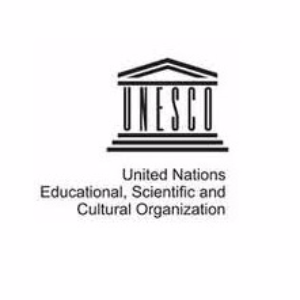A global challenge
Worldwide, every two seconds, someone is forcibly displaced from their home by conflict or persecution, according to the United Nations Refugee Agency (UNHCR). There are currently some 79.5 million displaced persons in the world, the highest number on record. Of these, 45.7 million are internally displaced, 26.0 million are officially classed as refugees and another 4.2 million are asylum-seekers. Five countries account
for 68% of all refugees: Syria (6.6 million), Venezuela (3.7 million), Afghanistan (2.7 million), South Sudan (2.2 million) and Myanmar (1.1 million) [UNHCR, 2020].
The scientific communities in these countries have been deeply affected by war, repression and dislocation. Consider Syria. Before the outbreak of civil war in 2011, Syria had scientific, medical and engineering institutions that were among the most respected and influential in the Arab region but, by 2015, the Syrian civil war had provoked perhaps the largest human migration seen since the Second World War. By this time, Syria counted 340 researchers (in head counts) per million inhabitants, according to the UNESCO Institute for Statistics. A rough calculation, therefore, suggests there could be more than 2 200 researchers among the 6.6 million Syrian refugees. This figure most likely excludes trained medical personnel and PhD students.
Indeed, the Covid-19 crisis in Europe, and the concomitant urgent need for more trained medical personnel, has shone a spotlight on the 14 000 Syrian doctors living in Germany alone who are waiting for their qualifications to be approved (Connolly, 2020).
It is not only outbreaks of violence that compel people to flee their homes. Venezuela, for example, once had a vibrant research sector but has witnessed socio-economic and political instability that has propelled more than five million Venezuelans – almost 20% of the population – out of the country, as of 2020.
This exodus began more than a decade ago but it surged in 2015 and is still ongoing as conditions deteriorate. By one estimate, Venezuela counted an estimated 12850 researchers in 2014 but only about 3000 remained a few years later (Bolaños-Villegas et al., 2020).
According to a personal communication by Gioconda SanBlas, former president of the Venezuelan Academy of Physical, Mathematical and Natural Sciences, major Venezuelan universities have lost around 45% of their academic staff. This brain drain caused the country’s scientific productivity to
nosedive from 1 695 to 1 091 publications between 2014 and 2019 (see chapter 7).
Scientific expertise must not go to waste
It is the considered view of UNESCO and like-minded organizations that both the global scientific community and governments have a strong interest in understanding the experience of displaced scientists and supporting them, to ensure that their skills and training do not go to waste. To be effective, scientists, engineers and medical doctors must stay abreast of advances in their field. Time spent in refugee camps, travelling to and settling in new countries, perhaps caring for families and taking on menial jobs to ensure a basic income, all detract from the exigencies of a scientific career.
Governments and other stakeholders must be able to identify highly trained individuals rapidly and integrate them in universities, research institutions, teaching hospitals and private enterprises. In so doing, host countries will serve their own interests while enabling displaced scientists to preserve and develop their expertise and live in dignity until conditions improve enough for them to return home – for many of them will, ultimately, return to their countries of origin, where their expertise will be needed to help rebuild their societies.
This is a chapter of the UNESCO Science Report The Race against Time for Smarter Development. You can download the full chapter here.

